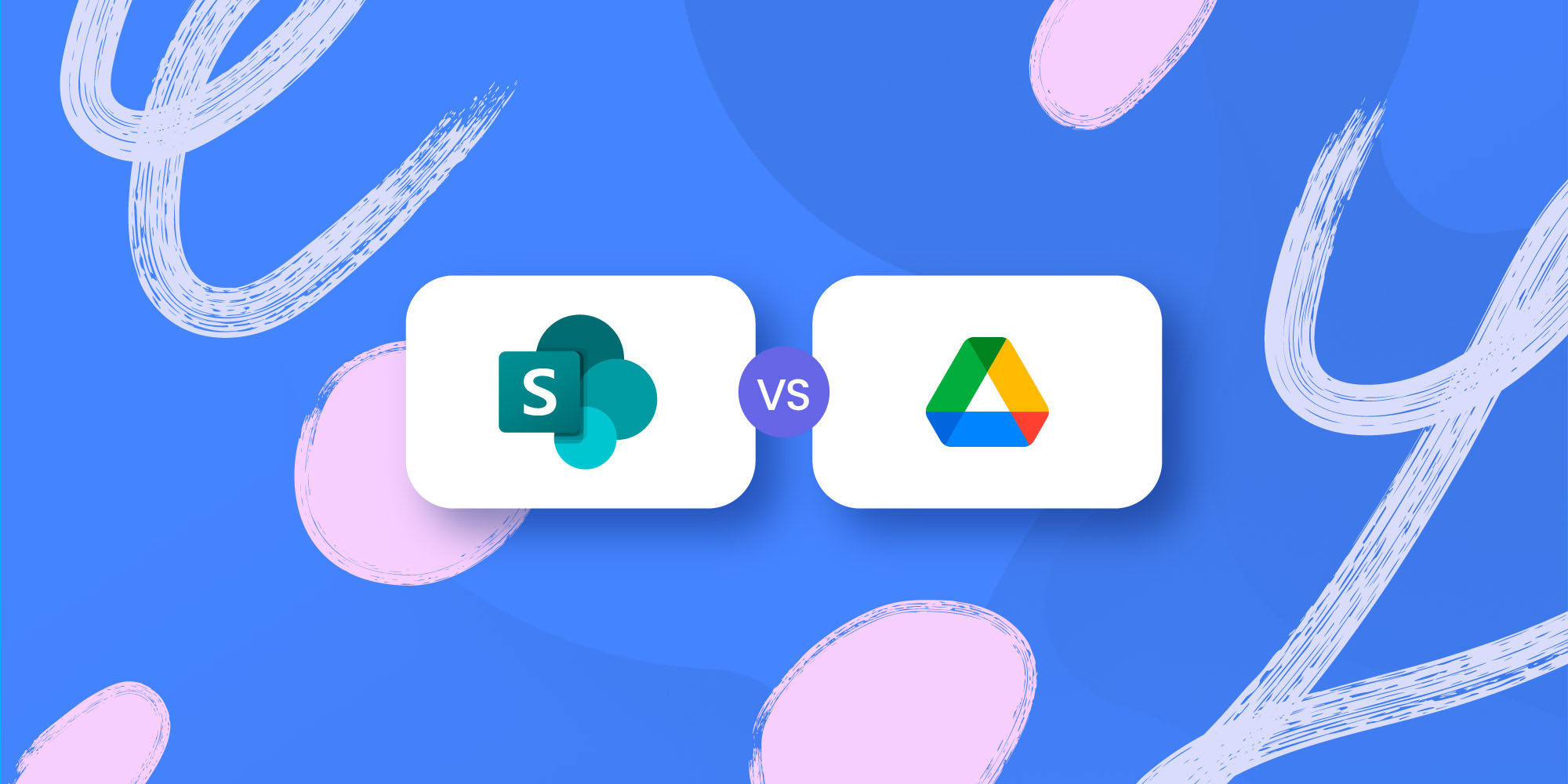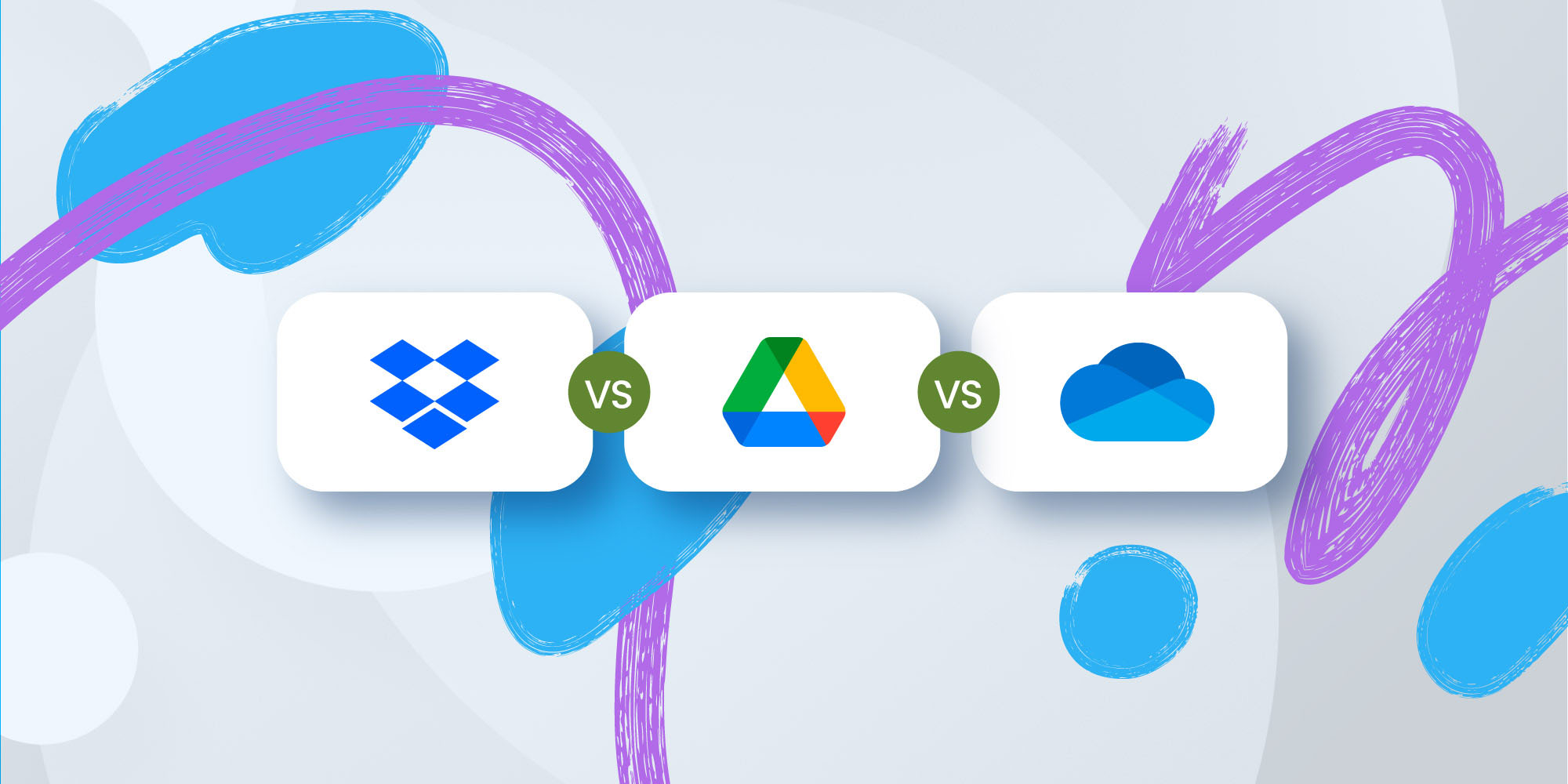Google Drive and Google Cloud Storage are both cloud storage solutions, though they differ in purpose. Google created them to provide individuals or businesses with the exact capabilities and features to encourage collaboration and allow users to access their files from anywhere.But... what is exactly the difference between them? Which one is better in this Google Drive vs Google Cloud Storage battle? And which one is more suitable for your business? Keep reading to discover their differences and similarities!

What is Google Drive?
Google Drive is a cloud-based storage service that provides access to Google’s productivity tools, including Google Docs, Sheets, and Slides. While it's primarily designed for personal use, it’s also ideal for small businesses and teams. With 15 GB of free storage, you can keep documents, images, videos, and audio files all in one place, accessible from any device with an internet connection.
In addition to storing your files, Google Drive makes collaboration a breeze. You can create and edit documents in real-time with others, making teamwork seamless and efficient. Integration with other Google services like Gmail and Google Photos ensures that managing and sharing files is straightforward and convenient. Whether you're working alone or with a team, Google Drive helps streamline your file management and enhance productivity.
If you're a developer or business user, learning how to unlock Google Drive API can open up advanced capabilities like automation, custom file workflows, and deeper integrations with other tools.

Advantages of Google Drive
1. Generous free storage
Google Drive starts you off with 15 GB of free storage. That’s plenty of space for your documents, photos, and even some videos, without having to pay a cent.
2. Seamless integration
Google Drive integrates smoothly with other Google services like Gmail and Google Photos. This means you can save email attachments directly to Drive and easily manage your photos and videos in one place.
3. Real-time collaboration
Working on a project with others? Google Drive lets you and your team edit documents, spreadsheets, and presentations together in real time. Everyone sees the changes instantly, making teamwork more efficient.
4. Access from anywhere
As long as you have an internet connection, you can access your files from any device—be it a computer, tablet, or smartphone. This flexibility means you’re never out of reach from your important documents.
5. Easy sharing options
Google Drive makes sharing files and folders simple. You can choose who has access to your documents and what they can do—view, comment, or edit—making collaboration and file sharing hassle-free.

Disadvantages of Google Drive
1. Limited free Storage
The 15 GB of free storage may not be enough for users with extensive file needs, particularly if you have a lot of high-resolution photos or large video files. You might find yourself needing to upgrade sooner than expected.
2. Privacy concerns
Storing your files on Google Drive means they’re on Google’s servers. While Google has strong security measures, some users may still be concerned about their privacy and data being stored on a third-party server.
3. Requires internet access
To fully use Google Drive, you need an internet connection. While you can access some files offline, full functionality, including collaboration and syncing, requires being online.
4. Complex organization
With a lot of files and folders, Google Drive's organization can get messy. Managing and finding files can become challenging if you don’t keep things well-organized from the start.
5. Compatibility issues
Some file formats or specific features in documents might not always be perfectly compatible between Google Drive and other software or platforms. This can lead to formatting issues or difficulties when opening files with different programs.

What is Google Cloud Storage?
Google Cloud Storage is a scalable cloud-based service designed to store and manage large amounts of data efficiently. Unlike Google Drive, which is tailored for individual users and small teams, Google Cloud Storage caters to businesses and developers with more extensive needs. It provides flexible storage options for everything from documents to massive datasets and media files, all accessible via a pay-as-you-go model that scales with your needs.
Google Cloud Storage integrates seamlessly with other Google Cloud Platform services, enhancing its functionality for building and deploying applications. It offers high durability and reliability, ensuring your data remains safe and accessible across multiple locations. Whether you're handling big data, archiving information, or serving content to users, Google Cloud Storage provides a comprehensive solution with advanced features for managing and securing your data.
Advantages of Google Cloud Storage
1. Scalable storage solutions
Google Cloud Storage offers scalable storage, allowing you to easily adjust your capacity as your needs grow. This means you can manage everything from a few gigabytes to petabytes of data without hassle.
2. Flexible pricing
The pay-as-you-go pricing model ensures you only pay for the storage you use. This flexibility helps optimize costs based on your storage and retrieval needs, making it a cost-effective solution for varying data volumes.
3. High durability and availability
With high durability, Google Cloud Storage redundantly stores data across multiple locations. This setup guarantees that your data is safe and accessible even in the face of hardware failures or disasters.
4. Integration with Google Cloud Services
Seamlessly integrating with other Google Cloud Platform products like BigQuery and Compute Engine, Google Cloud Storage enhances your ability to manage, analyze, and deploy data across various applications.
5. Advanced security features
The service offers robust security, including encryption at rest and in transit, as well as fine-grained access controls. These features protect your data from unauthorized access and breaches.
Disadvantages of Google Cloud Storage
1. Complex pricing structure
The pay-as-you-go model, while flexible, can be complex. Different storage classes and data retrieval costs may require careful management to avoid unexpected expenses. You can see the pricing chart to calculate how much it'll cost your company to acquire it.
2. Requires technical expertise
Setting up and managing Google Cloud Storage often demands technical knowledge. It may not be as user-friendly for individuals or small teams lacking IT expertise. So, in a word: Complexity. It can be hard to set up and manage, especially for organizations new to cloud computing.
3. Internet dependency
To fully utilize Google Cloud Storage, you need a stable internet connection. While data is stored in the cloud, accessing and managing it depends on your connectivity, which can be a limitation in areas with poor internet access.
4. Potential for data transfer costs
Transferring large amounts of data to and from Google Cloud Storage can incur additional costs. Frequent data movement might lead to higher expenses, which is important to consider for regular data transfers.
5. Management overhead
The advanced features and integration options come with added management responsibilities. Setting up access controls and monitoring usage requires ongoing effort and attention, which can be a challenge for some users.
Google Drive vs Google Cloud Storage: Key differences
Now that we established their basic information and most relevant difference (one is designed for individuals, and the other for businesses), it's time to take an in-depth look at their differences according to features, pricing, security, support, and more.
Features and specs
Google Drive is designed for individuals, small businesses, and teams who need to store and access documents, images, videos, and audio files. It provides a simple, intuitive interface and comes with Google's suite of productivity tools, including Google Docs, Sheets, and Slides.
On the contrary, Google Cloud Storage is designed for businesses and organizations that store and manage large amounts of unstructured data. Thus, it's packed with features like versioning, access control, and data management to make it easy to work with a high amount of information.
Storage
As mentioned above, Google Drive provides free storage of up to 15GB, with the option to upgrade for a fee.
As for Google Cloud Storage, the platform is scalable and designed to store large amounts of data, making it ideal for businesses with high storage requirements.
Pricing
Due to the nature of the tool, Google Drive is much more affordable than Google Cloud Storage. You can request a 100GB upgrade for $1.99/month if its free version is insufficient.
When it comes to Google Cloud Storage, you'll need first to make a few decisions regarding data storage, processing, and network usage to calculate the monthly cost. Plus, the price will differ depending on your area.
Security settings
Google Drive and Google Cloud Storage use SSL encryption to protect your data. But since the latter is oriented to business, it added additional security features, such as versioning and access control, to ensure the safety of your data.
On this point, there's little difference between the two. Google offers 24/7 support (in the US) for their clients. However, if you choose Google Cloud Storage, individuals might not be able to contact it (it's more likely that your company can solve any issue with its level 3 IT support).
User interface and usability
Google Drive offers a user-friendly interface designed for ease of use by individuals and small teams. It focuses on simplicity and integration with Google’s productivity tools, making it straightforward to upload, organize, and collaborate on files.
In contrast, Google Cloud Storage is built for developers and IT professionals who need advanced management capabilities. Its interface is more technical, designed for managing large datasets and configuring complex storage solutions. It may require a higher level of technical knowledge to navigate and utilize effectively.
Data Management features
Google Drive includes basic features for file organization, sharing, and collaboration. It supports document editing and version history within its suite of productivity tools, but it lacks advanced data management capabilities.
Google Cloud Storage, however, provides sophisticated data management features like object versioning, lifecycle management, and fine-grained access control. These tools are essential for businesses managing large volumes of data and needing to implement policies for data retention, archiving, and deletion.
Integration and ecosystem
Google Drive is deeply integrated with Google’s consumer-focused services, such as Gmail, Google Photos, and Google Meet. This integration streamlines workflows for personal and small business users, making it easy to manage and share files across various Google applications.
Google Cloud Storage integrates with a wide range of Google Cloud Platform services, including BigQuery, Dataflow, and Pub/Sub. This extensive ecosystem support is tailored for businesses and developers, enabling complex data processing and analytics workflows that are not typically needed for personal or small business use.
Final thoughts
Ultimately, choosing between Google Drive and Google Cloud Storage depends on your needs. Google Drive is an excellent choice for individuals or small businesses seeking an easy-to-use and affordable storage solution for files and collaboration.
For larger organizations or those with extensive data requirements, Google Cloud Storage is the better option. It offers scalability, advanced data management features, and high durability, making it a robust choice for managing and securing large volumes of data.
Frequently Asked Questions (FAQs)
1. Is Google Drive the same as Google Cloud Platform?
No. Even though they are cloud storage solutions, Google Drive is not a platform. It's a solution for individual users and thus has different features than Google Cloud.
2. Which is better: Google Drive or Google Cloud Storage?
That will depend on what you'll be using them for. If you are an individual or small business, Google Drive might be the best move. Otherwise, Google Cloud Storage ensures security compliance and data management for bigger companies.
3. When should I use Google Cloud Storage?
Google Cloud Storage is perfect for well-established businesses in need of a data management and collaboration platform since it provides you with enough features to handle information efficiently and securely.
Is Google Cloud different than iCloud?
Yes. iCloud is supported by Apple and offers storage space for audio, videos, and documents. On the contrary, Google Cloud is supported by Google to help big enterprises use their data more efficiently.















